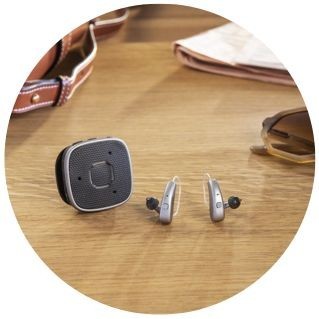Hearing Aid Accessories UK
Hearing aid accessories that solve real problems for patients
Latest Hearing Aid UK Update: 17/02/2026
Are hearing aids and accessories the perfect combination?
Wireless accessories for hearing aids have revolutionised the way people with hearing loss experience the world around them. These innovative devices offer a wide range of benefits that enhance the functionality, convenience, and overall quality of life for individuals who rely on hearing aids.
Digital hearing aid manufacturers are constantly developing their approach to hearing care to make a dramatic difference to those with hearing loss and ultimately improve their quality of life. Giving you flexibility, convenience, and useful tools to complement your lifestyle and needs.
Here we take a look at all the popular hearing aid accessories available on the market from all the main manufacturers, how they can help you, and the alternatives throughout the brands. Please remember that this list is not exhaustive, and compatibility depends on what hearing aids you currently have.
Are my hearing aids compatible with wireless hearing aid accessories?
If your hearing aid supports wireless connectivity, you can use hearing aid accessories to connect to various devices such as your television. We recommend that you speak with your local audiologist to advise you on what hearing aid accessories would benefit you the most.
Can you buy hearing aid accessories online? Although most hearing aid wearers prefer to go through their audiologist for their hearing aid accessories, you can source and purchase them online easily. If this is the route you wish to take, ensure that you research prices and the warranty policy.
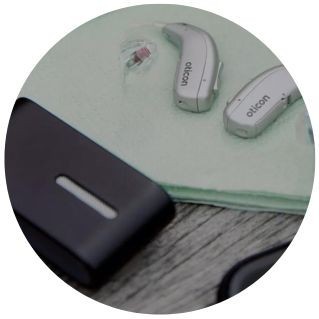
Exploring the hearing aid accessories market
What are hearing aid accessories?
What are the most common accessories for hearing aids?
Most hearing aids come with a choice of accessories that can be purchased at the time or after the hearing aids have been worn for some time. These include wireless transmitters that enable the sound from a television, telephone, or other devices to “beam” sound into the hearing aid.
The need for certain assistance by way of accessories can sometimes heavily influence the choice of make or model of hearing aid required. There are some useful ones, and you should discuss accessories with your hearing aid dispenser, as you may be missing out.
Can my audiologist get me hearing aid accessories?
As I mentioned earlier, a lot of our customers prefer to go through the audiologist we put them in touch with to source their hearing aid accessories. Most audiologists keep a small selection in stock of popular hearing aid accessories, but if they don't have the accessory you require, they can order these products for you.

Hearing Aid Accessories
Wireless Microphone
A wireless microphone is a device that can be used in conjunction with hearing aids to amplify sound. The microphone can be placed near the source of the sound, such as a speaker or television.
The audio is transmitted wirelessly to the hearing aid, allowing the wearer to hear the sound more clearly.
Good for hands-free calls, streaming music from your mobile, controlling your hearing aids remotely, and enhancing someone’s voice from a distance with this hearing aid accessory.
Wireless microphones are considered one of the best hearing aid accessories to improve speech understanding.
Enjoy clear conversations in busy atmospheres, like restaurants and coffee shops, by changing your hearing aids into wireless headphones, gaining high-quality sound wherever you are.
Oticon's ConnectClip is a great example of this, as seen in this image.
How do I get started with a wireless microphone hearing aid accessory?
The person you are talking to would wear the clip-on hearing aid accessory and their voice will be transmitted straight into your hearing aids.
What if I don't have a hearing aid with Bluetooth and I want to use a wireless microphone hearing aid accessory?
It'll be different for other brands, but with Oticon, you can use the ConnectLine microphone instead, using the Streamer Pro to benefit from easier and more comfortable conversations. However, some older hearing aid models might not be compatible with wireless microphone hearing aid accessories.
Speak with your audiologist to determine if your particular hearing aid is compatible with a wireless microphone.
How can a wireless microphone hearing aid accessory support your hearing?
Wireless microphones can be particularly useful for those with hearing loss who have difficulty hearing in noisy environments or at a distance.
For example, a person could use a wireless microphone to listen to a lecture in a classroom or to hear a speaker at a meeting. Extra support for students with hearing loss or people who wear hearing aids in the workplace is beneficial for everyone.
Employers can adopt hearing aid accessories as part of their reasonable adjustments to provide a safe and inclusive work environment for employees with hearing loss.
Some wireless microphones are also equipped with additional features, such as noise reduction technology, which can further improve the clarity of sound and speech understanding.
When to use and where to buy a wireless microphone hearing aid accessory
This hearing aid accessory is for everyday use and can be purchased from your audiologist. There are a few different types of wireless microphones available, including those that are worn around the neck (also known as a neck loop).
For example, the Phonak Roger NeckLoop, which can be attached to a clothing lapel, as well as those that are handheld.
The specific type of wireless microphone that is best suited for an individual's needs will depend on their preferences and the specific features they are looking for.
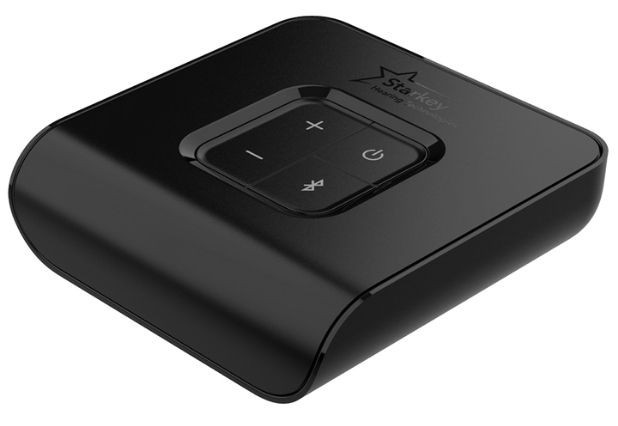
Hearing Aid Accessories
TV Adapter
A TV adapter is a device that can be used in conjunction with hearing aids to amplify the sound from a television. This hearing aid accessory is the best for seniors.
The adapter is connected to the television and transmits the audio wirelessly to the hearing aid.
Thus, it allows the user to hear the sound more clearly and gives better TV sound.
Connect your hearing aids to your TV and enjoy watching your favourite programs at the volume you want, so your family can hear at their level.
Starkey's Universal TV Streamer is a great example of this, as seen in this image.
How do I get started with a TV adapter hearing aid accessory?
Simply connect the adapter to your TV and place it next to it to enjoy streaming audio wirelessly. Listen to the TV at the volume that suits you without having to turn up the TV's volume and annoy your friends or family!
When to use and where to buy a TV adapter hearing aid accessory?
This is for everyday use, and you can purchase a TV adapter hearing aid accessory from your audiologist. They are ideal for a more comfortable listening experience and can decrease listening fatigue, reducing the mental strain.
Thus, allowing the patient to enjoy their entertainment can lead to improved mental health and quality of life.
How can a TV adapter hearing aid accessory support your hearing?
TV adapters can be particularly useful for individuals with hearing loss who have difficulty hearing the television, especially in noisy environments or when the volume is low.
Using a TV adapter can allow the user to adjust the volume of the television to a level that is comfortable for them, without disturbing others in the room.
There are a few different types of TV adapters available, including those that use Bluetooth technology to connect to the hearing aid and those that use a proprietary wireless connection.
The specific type of TV adapter that is best suited for an individual's needs will depend on their preferences and the specific features they are looking for.
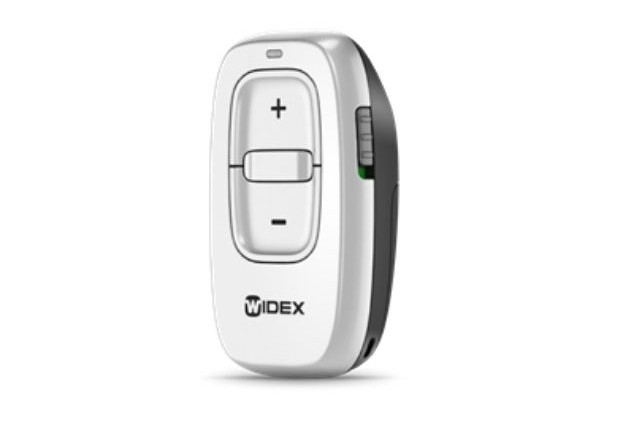
Hearing Aid Accessories
Remote Control
A remote control is a hearing aid accessory that allows the user to adjust the settings on their hearing aid without physically touching the device.
The remote control typically has buttons for adjusting the volume, selecting different listening programs, and muting the hearing aid.
Ideal if you don't use a smartphone or as an easy alternative to an app.
Some remote controls may also have additional features, such as the ability to change the volume of individual channels or to adjust the balance between the left and right hearing aids.
Widex's RC-DEX is a great example of a simple and intuitive remote control hearing aid accessory, as seen in the image.
How do I get started with a remote control hearing aid accessory?
All generic remote controls are usually small enough to fit on a keychain for convenience on the go. To use a remote control with a hearing aid, the hearing aid must be equipped with a wireless connectivity feature, such as Bluetooth.
The remote control is then paired with the hearing aid, allowing the user to control the device remotely.
It's worth noting that not all hearing aids have the capability to be controlled with a remote, so it's important to check with the manufacturer or hearing healthcare professional to determine if a particular hearing aid is compatible with a remote control.
When to use and where to buy
They can be used every day and purchased from your audiologist. Remote controls can be particularly useful for individuals with dexterity issues or for those who have difficulty reaching the hearing aid itself.
They can also be convenient for adjusting the hearing aid in noisy environments where it may be difficult to hear the buttons on the device.

Hearing Aid Accessories
Phone Adapter
A phone adapter can improve your landline calls by connecting your hearing aids to a traditional landline phone.
Supporting both outgoing and incoming calls. You can have more comfortable conversations with your landline phone with hearing aid accessories for phones.
Oticon's Connect Phone Adapter is a great example, as shown in the image. How do I get started, when to use, and where to buy a phone adapter hearing aid accessory?
- Connect your Phone Adapter to your landline phone.
- Then pair your Phone Adapter to your ConnectClip.
- Finally, pair your ConnectClip to your hearing aids, and you are good to go!
- For everyday use.
- Purchase a wireless microphone from your audiologist.
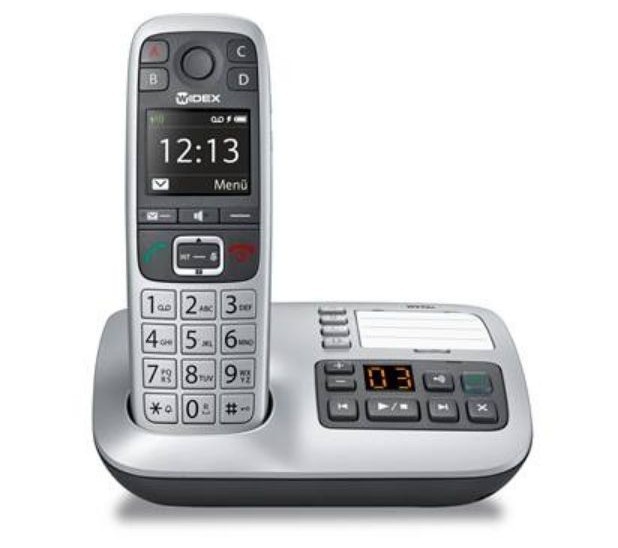
Hearing Aid Accessories
Telephone for hard-of-hearing
This type of telephone is designed for people with hearing loss. You can pair it with your hearing aids or use it as a conventional phone as well.
Telephones for the hard of hearing provide you with excellent speech understanding in both ears.
Widex's PHONE-DEX is a great example of a cordless phone that gives clear sound straight to your hearing aids with ease. Giving you brilliant speech understanding in both ears at the same time.
It can be used as a normal phone, and you don't even need hearing aids with an inbuilt telecoil - without the annoyance of feedback!
When to use and where to buy a phone for the hard of hearing? They can be used every day, and you can get a wireless microphone from your audiologist.
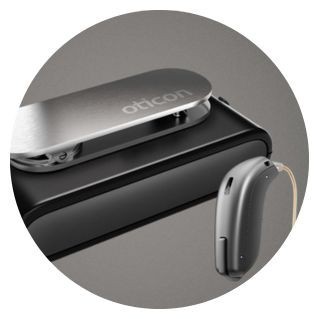
Advantages of Hearing Aid Accessories
Here are some key advantages of hearing aid wireless accessories:
1. Improved Connectivity
Wireless hearing aid accessories enable seamless connectivity between hearing aids and various audio sources such as smartphones, televisions, and computers.
This connectivity allows users to stream audio directly to their hearing aids, ensuring a clear and personalised listening experience.
It eliminates the need for bulky headphones or external devices.
2. Enhanced Speech Recognition
Many wireless hearing aid accessories include remote microphones that can be placed near a speaker or worn by a conversation partner.
These microphones transmit the speaker's voice directly to the hearing aids, significantly improving speech recognition and comprehension in challenging listening environments like noisy restaurants or crowded gatherings.
3. Hands-Free Control:
Wireless hearing aid accessories often come with remote control or smartphone apps, providing convenient and discreet control over hearing aid settings.
Users can adjust volume, change programs, and even fine-tune specific sound frequencies without reaching for their hearing aids.
This hands-free control feature enhances user autonomy and allows for effortless customisation.
4. Telecoil Compatibility:
Telecoils, also known as T-coils, are built-in components in many hearing aids.
Wireless hearing aid accessories utilise telecoil technology, enabling users to connect with hearing loop systems commonly found in public spaces such as theatres, places of worship, and conference halls.
This connectivity ensures optimal sound quality and accessibility in these environments.
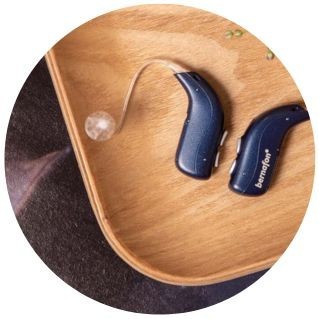
Digital Hearing Aid Bluetooth Accessories
Wireless hearing aid accessories brand comparison chart & names
Explore each manufacturer's accessories
If your hearing aid supports wireless Bluetooth connectivity then we recommend investing in digital wireless accessories to seamlessly connect to your at-home devices like your TV. Bluetooth hearing aid accessories will greatly improve your quality of life and complement your lifestyle.
Generally, hearing aid accessories can be personalised to your unique hearing loss needs - ask your audiologist to show you what's available to you. You can also ask your audiologist to try an accessory before you purchase it. This way, you'll get a better idea of how beneficial they can be in real-life scenarios.
What hearing aid accessories does each manufacturer offer?
More information on digital hearing aids:
►Digital hearing aids with Bluetooth
►Rechargeable digital hearing aids
►Digital hearing aids for Tinnitus
Looking for hearing aid accessories near me?
Overall, hearing aid accessories can be valuable tools to further improve hearing aid effectiveness and make them more convenient to use.
Additionally, by helping to improve the effectiveness of the devices, hearing aid accessories promote confidence and give an improved quality of life.
It's worth noting that the specific benefits of hearing aid accessories will depend on the individual's needs and preferences. Speak to your audiologist about these and which hearing aid accessories would suit your specific needs.
Call us free on 0800 567 7621 for support and advice with your hearing healthcare.
What's included in our hearing aid prices?
Our specialist service includes:
Do not spend hundreds of pounds without getting a second opinion from us.
Please call us on 0800 567 7621
 Not only are the prices great, but the service is fantastic! Many thanks to your team.
Not only are the prices great, but the service is fantastic! Many thanks to your team.Watch the video below to see some Starkey hearing aid accessory examples
Common questions about hearing aid accessories UK
Although most hearing aid wearers prefer to go through their own audiologist for their hearing aid accessories - you can source and purchase them online easily. If this is the route you wish to take, ensure that you research prices and the warranty policy.
Can my audiologist get me hearing aid accessories?
As I mentioned earlier, a lot of our customers prefer to go through the audiologist we put them in touch with to source their hearing aid accessories. Most audiologists keep a small selection in stock of the popular hearing aid accessories, but if they don't have the accessory you require - they can order these products for you.
What hearing aid manufacturers offer accessories?
All the main manufacturers offer hearing aid accessories and assisted devices. Check with your audiologist on the compatibility requirements of your hearing aids.
What is the cost of hearing aid accessories?
We don't list the prices of accessories as they can vary quite a lot. Sometimes the manufacturers may include an accessory in with the cost of the aid, other times they will bundle several together so that for example a TV streamer and remote control will be less if purchased together than if bought individually.
As a general guide, TV streamer boxes, wireless mics, etc are between £100 and £250. Remote controls are between £40 and £120.
What about hearing aid accessories NHS?
Does the NHS provide digital hearing aid accessories with their hearing aids? The short answer is no. Whilst the NHS provides a credible hearing health service and some good hearing solutions - they are currently unable to offer Bluetooth hearing aids accessories.
Where can I get hearing aid spares?
You can order hearing aid parts and spares from your audiologist, such as:
- Hearing aid tubes
- Hearing aid domes
- Hearing aid batteries
Other pages you might find useful
FAQs
In general, any audiologist will always recommend to you the hearing aid model that best suits your needs. Here is a useful checklist to make sure that is the case.
- Audiologist's level of knowledge: The audiologist you have seen will hopefully have a wide knowledge of all available hearing aids; however, some will only be familiar with a small number of brands and, therefore, may not really be in a position to know which model is the best for you. It is OK to challenge their recommendation and ask them to justify why this particular brand is the one for you.
- Do research: Read about the hearing aid that was recommended. Does it seem like it will suit your lifestyle? Does it have more or fewer features than you need?
- Be aware of sales targets: Many high street retailers have specific tie-ins to a particular manufacturer/brand. The hearing aid they have suggested may still be the correct one for you, but do your research so that you know why they might have recommended it.
If you have significant hearing loss in both ears, you should be wearing two hearing aids. Here are the audiological reasons why:
Localisation: The brain decodes information from both ears and compares and contrasts them. By analysing the minuscule time delays as well as the difference in the loudness of each sound reaching the ears, the person is able to accurately locate a sound source.
Simply put, if you have better hearing on one side than the other, you can't accurately tell what direction sounds are coming from.
Less amplification is required: A phenomenon known as “binaural summation” means that the hearing aids can be set at a lower and more natural volume setting than if you wore only one hearing aid.
Head shadow effect: High frequencies, the part of your hearing that gives clarity and meaning to speech sounds, cannot bend around your head. Only low frequencies can. Therefore, if someone is talking on your unaided side, you are likely to hear that they are speaking, but be unable to tell what they have said.
Noise reduction: The brain has its own built-in noise reduction, which is only really effective when it is receiving information from both ears. If only one ear is aided, even with the best hearing aid in the world, it will be difficult for you to hear in background noise as your brain is trying to retain all of the sounds (including background noise) rather than filtering them out.
Sound quality: We are designed to hear in stereo. Only hearing from one side sounds a lot less natural to us.
Fancy some further reading on this topic? You can read about why two hearing aids are better than one in our article, hearing aids for Both Ears, here
For most people, the main benefit of a rechargeable hearing aid is simple convenience. We are used to plugging in our phones and other devices overnight for them to charge up. Here are some other pros and cons:
For anybody with poor dexterity or issues with their fingers, having a rechargeable aid makes a huge difference, as normal hearing aid batteries are quite small and some people find them fiddly to change.
One downside is that if you forget to charge your hearing aid, then it is a problem that can't be instantly fixed. For most, a 30-minute charge will get you at least two or three hours of hearing, but if you are the type of person who is likely to forget to plug them in regularly, then you're probably better off with standard batteries.
Rechargeable aids are also a little bit bigger and are only available in Behind-the-Ear models.
Finally, just like with a mobile phone, the amount of charge you get on day one is not going to be the same as you get a few years down the line. Be sure to ask what the policy is with the manufacturer's warranty when it comes to replacing the battery.
For most people, the answer is yes. But it's never that simple.
The majority of hearing problems affect the high frequencies a lot more than the low ones. Therefore, open fitting hearing aids sound a lot more natural and ones that block your ears up can make your own voice sound like you are talking with your head in a bucket. Therefore, in-ear aids tend to be less natural.
However, the true answer is we can't tell until we have had a look in your ears to assess the size of your ear canal, and until we have tested your hearing to see which frequencies are being affected.
People with wider ear canals tend to have more flexibility, also there are open fitting modular CIC hearing aids now that do not block your ears.
There is also the age-old rule to consider, that a hearing aid will not help you if it's sat in the drawer gathering dust. If the only hearing aid you would be happy wearing is one that people can't see, then that's what you should get.
Most people can adapt to any type of hearing aid, as long as they know what to expect. Have an honest conversation with your audiologist as to what your needs are.
Generally speaking, six or more. Unless it's none at all. The number of channels a hearing aid has is often a simplistic way an audiologist will use to explain why one hearing aid is better than another, but channels are complex, and it is really not that straightforward. Here are some reasons why:
Hearing aids amplify sounds of different frequencies by different amounts. Most people have lost more high frequencies than low, and therefore need more amplification in the high frequencies. The range of sounds you hear is split into frequency bands or channels, and the hearing aids are set to provide the right amount of hearing at each frequency level.
Less than six channels, and this cannot be done with much accuracy, so six is the magic number. However, a six-channel aid is typically very basic with few other features and is suitable only for hearing a single speaker in a quiet room. The number of channels is not what you should be looking at; it's more the rest of the technology that comes with them.
As a final note, different manufacturers have different approaches. One method is not necessarily better than any other. For example, some manufacturers have as many as 64 channels in their top aids. Most tend to have between 17 and 20. One manufacturer has no channels at all.
Manufacturer's warranties typically last between 2-5 years, depending on the brand and model, and cover defects in materials and workmanship. This includes repairs for component failures, electronic malfunctions, and manufacturing defects, but excludes damage from misuse, accidents, or normal wear. Most manufacturers also include loss and damage insurance for the first year.
We handle all warranty claims on your behalf, liaising with manufacturers and ensuring you get replacement devices quickly when needed. This comprehensive warranty coverage, combined with our lifetime aftercare, gives you complete peace of mind.
Our hearing tests are completely free, whether at our clinics or in your home. Unlike other providers who charge £30-£100 for home visits, we believe hearing healthcare should be accessible without financial barriers. Our comprehensive assessments include examination by a registered audiologist, audiogram results, and personalised recommendations.
All testing, future adjustments, and ongoing support are included at no extra cost. While NHS tests are also free, typical 6-week waiting periods often lead people to seek immediate private testing. We provide prompt, professional assessments that fit your schedule and budget.
Yes, we offer completely free home visits throughout the UK, and this service is included in our prices with no additional charges. Home visits are particularly valuable for people with mobility issues, busy schedules, or those who simply prefer the comfort and convenience of their own environment.
Our audiologists can conduct full hearing tests, fit hearing aids, and provide ongoing support in your home. This service sets us apart from many providers who either don't offer home visits or charge extra for them.
We can offer prices up to 40% lower than high street retailers because of our business model. As a network of 200+ independent audiologists, we don't have the massive overheads of large retail chains - no expensive high street premises, no sales targets pushing audiologists to sell the most expensive options, and no costly marketing campaigns.
However, we maintain the same buying power as the big chains because we purchase on behalf of our entire nationwide network. This means you get access to the same premium hearing aids with professional service, but at genuinely competitive prices.
We offer a comprehensive 60-day money-back guarantee, which gives you twice the industry standard time to properly assess whether your hearing aids are right for you. This extended period recognises that adjusting to hearing aids takes time, and your brain needs several weeks to adapt to the amplified sounds.
Unlike many providers who offer just 30 days, we believe 60 days gives you the confidence to test your hearing aids in all the situations that matter to you - from quiet conversations at home to busy restaurants and outdoor activities.
Ask the Experts
6 Morton Lane
Walkwood
Redditch
Worcestershire
B97 5QA
Latest Launch
When we refer to a product as 'Latest Launch', we mean it is the latest to be released on the market.
New
When we refer to a product as 'New', we mean that the product is the newest hearing aid model on the market.
When we refer to a product as 'Superseded', we mean that there is a newer range available which replaces and improves on this product.
Older Model
When we refer to a product as an 'Older Model', we mean that it is has been superseded by at least two more recent hearing aid ranges.

